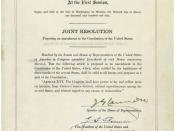Fiscal federalism is the result of the states' dependence on the national government for funds. Until 1913, the national government had minimal monetary resources, thus possessing little control over the affairs of the states. Once effected, the Sixteenth Amendment resulted in the amassing of government funds on the national level. This reserve of money enabled the national government to initiate a multitude of national programs--such as the interstate highway--as well as provide grants to the states. It is primarily through these grants that the national government can exert influence over state affairs; for, by designating restrictions in the distribution of these grants, the national government can compel states and localities to make or alter policies and legislation in accordance with its agenda. The manner in which the national government has wielded the influence of money throughout the history of the nation has continually altered intergovernmental relations. Since the Depression, fiscal federalism has caused the national government to dominate the states; recently, however, reforms have begun to return power to the states.
Policies and precedents of the New Deal centralized power in the national government. To remedy the devastation of the Great Depression, it assumed a more direct and prevalent role in the lives of the people. Congress passed the 1935 Social Security Act, providing retired persons pensions and benefits for the unemployed and disabled. In addition to Social Security, the government also established the Federal Emergency Relief Administration in 1933 which provided states with money for the needy. The Aid to Families with Dependent Children (AFDC) program was state-administered and federally funded, another example of state dependence on the national government. The Works Progress Administration is one of the multitude of programs implemented to provide employment to aid in recovery. Formerly a state responsibility, the national government became
the primary...


